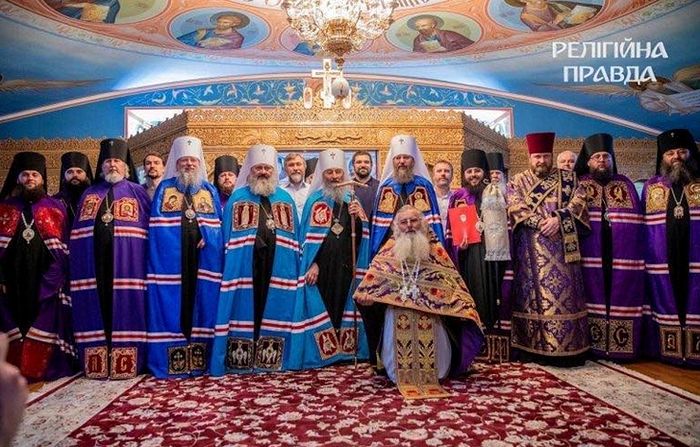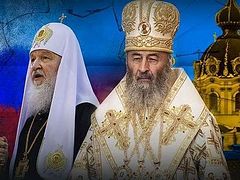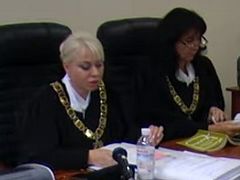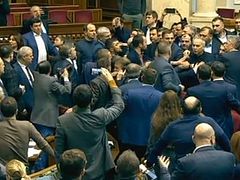Kiev, April 13, 2020
 Deputy Head of the Office of the President Sergei Trofimov with Met. Onuphry and hierarchs of the canoincal Ukrainian Church
Deputy Head of the Office of the President Sergei Trofimov with Met. Onuphry and hierarchs of the canoincal Ukrainian Church
The law on the forced renaming of the Ukrainian Orthodox Church and the re-registration of parishes to the Constantinople-created “Orthodox Church of Ukraine” are manifestations of pressure and political manipulation, in which the state should have no part, according to the Office of the President of Ukraine.
Sergei Trofimov, the First Deputy Head of the Office of the President, spoke with the Ukrainian outlet Glavkom on April 10, commenting on law No. 5309, which forces the Ukrainian Orthodox Church to rename itself to the “Russian Orthodox Church in Ukraine,” though the matter has been held up in court since the law was passed in December 2018.
Regarding the transfer of parishes to the OCU, Trofimov noted that this process has halted because it was “unfortunately very politicized. People decide for themselves which confession to belong to and what religion to be. But politically, these manipulations about the Moscow Church [the canonical Ukrainian Church—Ed.] and others are fictitious, built up, and rolled out.”
Despite the slander against it, the Ukrainian Church serves and is served by Ukrainians, the Deputy Head explained.
“There is the Ukrainian Orthodox Church, where Ukrainian priests and Ukrainian monastics service, and the parishioners are citizens of Ukraine. I mean, no one brought anyone here from Tajikistan,” Trofimov said, noting that he does not get involved in such questions professionally, though he will uphold the law when necessary, including where it involves Church issues.
“I get a lot of letters and appeal about illegal re-registrations, with pressure on the ground. Therefore, the heads of the provincial administrations are tasked with monitoring the legality of these processes,” he noted.
As President Vladimir Zelensky has stated many times, the Church is separated from the state and the state from the Church, and Trofimov himself holds the same position, he emphasizes.
“The Ukrainian Orthodox Church appeals to us saying we don’t need any preferential or special treatment. All we need is to not be pressured like in recent years. That’s all they’re asking for,” the representative of the Office of the President said.
Asked if law No. 5309 is an example of pressure against the UOC, Trofimov responded: “Of course it is pressure, in my opinion.”
***
***
Under former President Poroshenko, the Ukrainian Parliament adopted a number of laws aimed against the canonical Ukrainian Church, including Bill No. 5309, according to which all religious organizations having governing bodies in an aggressor country must include the name of their parent organization in their titles. As Russia is officially considered an “aggressor country” by Ukraine, the bill would have forced the Ukrainian Orthodox Church to rename itself as the “Russian Orthodox Church in Ukraine,” with the aim of persuading the Ukrainian people that the UOC is administered in Moscow, although it enjoys full administrative independence and is governed by Ukrainians in Kiev.
As Church authorities have successfully pointed out, there is no legal relationship between the Ukrainian Orthodox Church and the Russian Orthodox Church.
The bill was passed by the Ukrainian Rada on December 20, 2018, and signed into law by President Poroshenko two days later.
The law is widely acknowledged as a thinly-veiled attack on the canonical Church, facilitating the seizure of its parishes and monasteries. “Patriarch” Philaret Denisenko even openly stated how the law would be used to take the Kiev Caves and Pochaev Lavras away from the UOC.
The Ministry of Culture set April 26, Holy Friday, as the last day for the Ukrainian Church to legally change its name, though several court decisions halted that process in the meantime. The Ukrainian Church brought its claim against the Ministry of Culture in March.
In July, the Sixth Kiev Administrative Court of Appeals dismissed the Ministry of Culture’s appeal against the Church on the matter.
In December, the Supreme Court of Ukraine rejected the Ministry of Culture’s appeal to force the canonical Church to rename itself, forbidding registration authorities to undertake any actions of entering information on the Kiev Metropolis of the UOC and of its structural religious organizations into the state registry until a resolution of the dispute on the merits.
In February, the case opened in the Constitutional Court of Ukraine.



